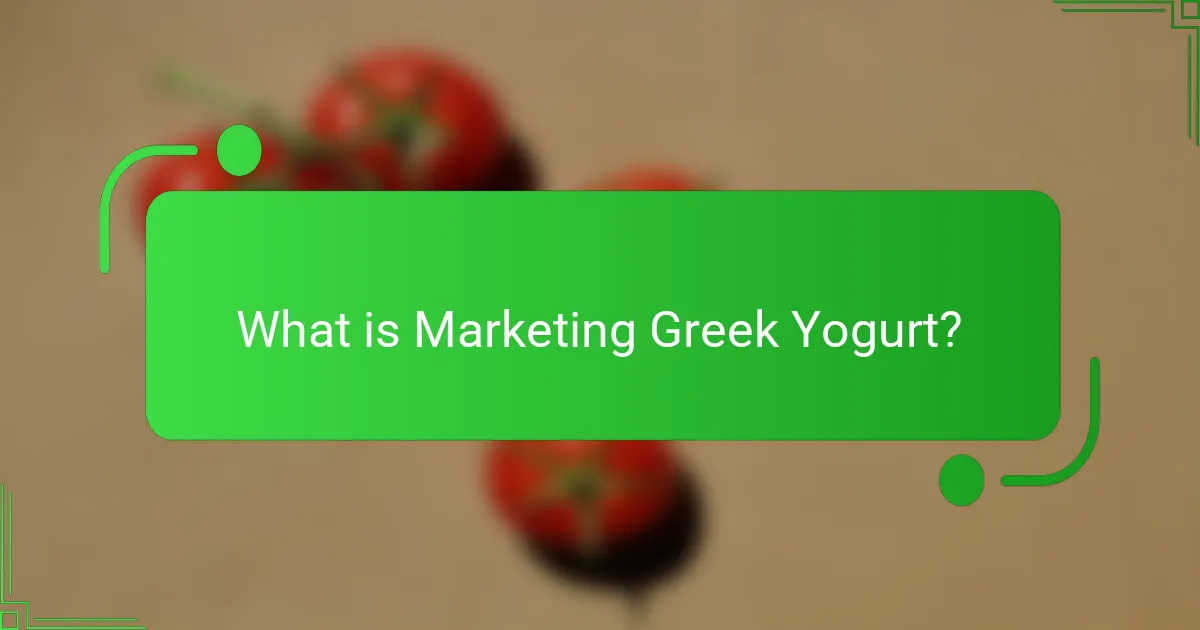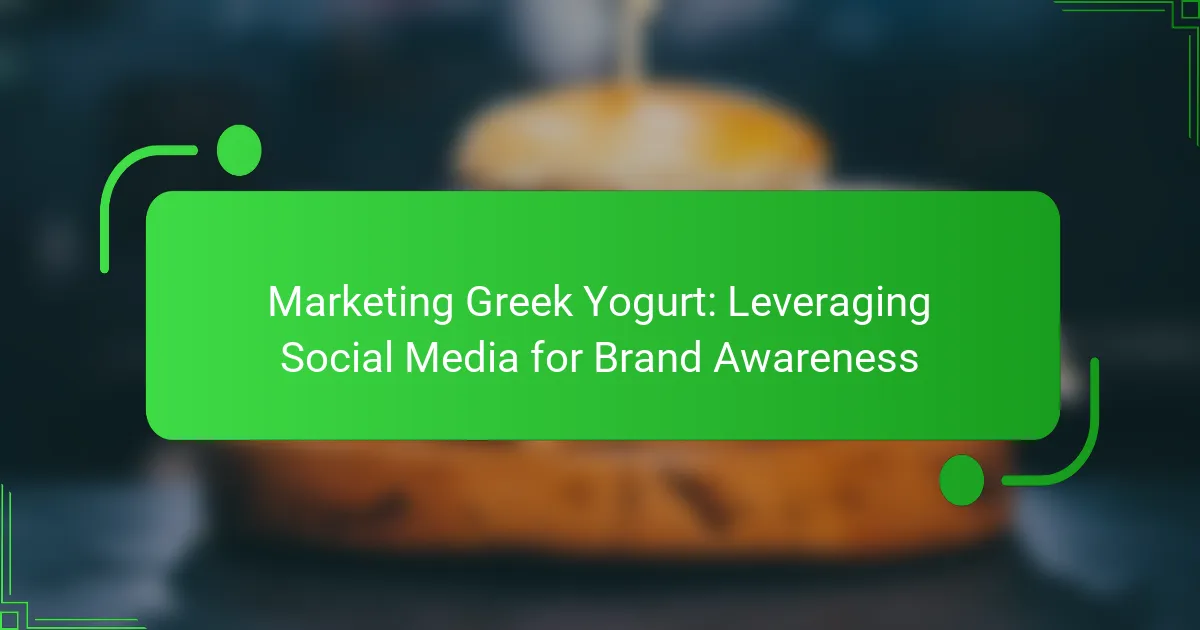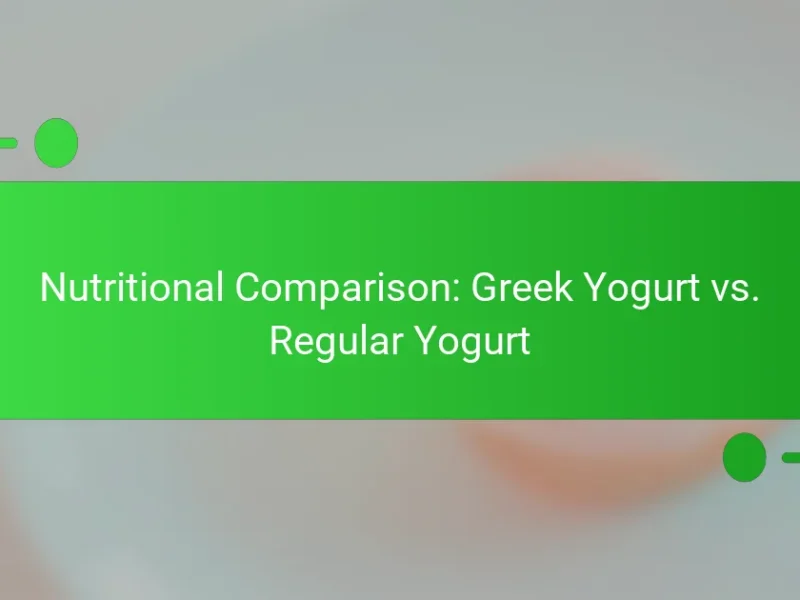Greek yogurt is a high-protein dairy product characterized by its thick texture, making it popular among health-conscious consumers. Effective marketing strategies for Greek yogurt focus on promoting its nutritional benefits and culinary versatility through social media platforms. Engaging content, including recipes and user-generated experiences, fosters community and brand loyalty. Collaborations with influencers and targeted advertising enhance brand visibility, while key performance metrics such as engagement rates, conversion rates, and audience sentiment provide insights into marketing effectiveness. This article explores the various tactics and metrics that contribute to successful social media marketing for Greek yogurt.

What is Marketing Greek Yogurt?
Marketing Greek yogurt involves promoting this specific type of yogurt to consumers. Greek yogurt is known for its thick texture and high protein content. Marketing strategies often highlight these attributes to attract health-conscious buyers. Campaigns may utilize social media platforms to increase brand visibility. Engaging content, such as recipes and health benefits, is commonly shared. This approach helps build a community around the product. Research shows that effective social media marketing can boost brand awareness significantly. Brands often collaborate with influencers to reach wider audiences.
How does social media play a role in marketing Greek yogurt?
Social media plays a crucial role in marketing Greek yogurt by enhancing brand visibility and engagement. Platforms like Instagram and Facebook allow brands to showcase their products visually. Engaging content, such as recipes and health benefits, attracts potential customers. User-generated content also boosts authenticity and trust. Brands leverage influencers to reach wider audiences effectively. Social media advertising targets specific demographics, increasing conversion rates. According to a study by Statista, 54% of consumers use social media for product research. This data underscores the importance of social media in influencing purchasing decisions.
What platforms are most effective for promoting Greek yogurt?
Social media platforms are most effective for promoting Greek yogurt. Platforms like Instagram, Facebook, and Pinterest excel in visual content sharing. Instagram’s focus on images makes it ideal for showcasing Greek yogurt recipes and health benefits. Facebook allows for community engagement through groups and targeted ads. Pinterest serves as a resource for users seeking healthy eating inspiration, making it effective for recipe sharing. According to a study by Sprout Social, 79% of consumers prefer to engage with brands on social media. This indicates that social media marketing can significantly boost brand awareness for Greek yogurt.
How can brand messaging be tailored for social media audiences?
Brand messaging can be tailored for social media audiences by focusing on authenticity and engagement. Social media users prefer relatable content that reflects their values. Brands should use conversational language to foster a sense of community. Visual elements like images and videos enhance message retention. User-generated content can increase trust and authenticity. Tailoring content to specific platforms is crucial; for example, Instagram favors visuals while Twitter focuses on concise text. Data shows that posts with personalized messages achieve higher engagement rates. Brands should analyze audience insights to refine their messaging strategy continually.
What are the key benefits of marketing Greek yogurt on social media?
Marketing Greek yogurt on social media enhances brand visibility and engagement. Social media platforms reach a wide audience, allowing brands to showcase their products effectively. Visual content, such as recipes and health benefits, attracts user interaction. User-generated content increases authenticity and trust among consumers. Targeted advertising on social media can drive specific demographics to the brand. Analytics tools provide insights into consumer behavior and preferences. This data helps refine marketing strategies for better results. Social media fosters community building around health-conscious lifestyles, promoting brand loyalty.
How does social media increase brand awareness for Greek yogurt?
Social media increases brand awareness for Greek yogurt by facilitating direct engagement with consumers. Platforms like Instagram and Facebook allow brands to showcase their products visually. This visual content can highlight unique attributes, such as health benefits and versatility in recipes. Engaging posts encourage shares and likes, expanding the brand’s reach. User-generated content, like customer reviews and recipes, further enhances credibility. According to a 2021 survey, 70% of consumers are influenced by social media when making food choices. This demonstrates the significant role of social media in shaping perceptions of Greek yogurt brands.
What consumer engagement strategies can be employed?
Consumer engagement strategies that can be employed include social media interaction, content marketing, and loyalty programs. Social media interaction involves responding to customer comments and messages promptly. This builds a community around the brand, fostering loyalty. Content marketing focuses on creating valuable and informative content that resonates with the target audience. This can include recipes, health benefits, and lifestyle tips related to Greek yogurt. Loyalty programs incentivize repeat purchases by offering rewards or discounts. According to a study by Bond Brand Loyalty, 79% of consumers are more likely to continue doing business with brands that offer loyalty programs. These strategies collectively enhance consumer engagement and promote brand awareness effectively.

What strategies can be used to leverage social media for Greek yogurt marketing?
Utilizing social media for Greek yogurt marketing involves several effective strategies. Engaging content creation is essential. Posting recipes that incorporate Greek yogurt can attract cooking enthusiasts. User-generated content encourages customers to share their experiences. This builds community and trust around the brand. Influencer partnerships can expand reach. Collaborating with health and wellness influencers can introduce Greek yogurt to new audiences. Regular promotions and contests can drive engagement. Offering discounts or giveaways encourages sharing and participation. Utilizing targeted ads on platforms like Instagram can reach specific demographics. Data from a 2021 survey showed that 70% of consumers engage with brands on social media. This highlights the importance of maintaining an active social media presence.
How can content creation enhance Greek yogurt marketing efforts?
Content creation can significantly enhance Greek yogurt marketing efforts by engaging consumers through informative and appealing content. High-quality content showcases the health benefits and versatility of Greek yogurt. It can include recipes, nutritional information, and lifestyle tips that resonate with health-conscious audiences. Engaging blog posts and social media updates can build brand awareness and foster community interaction. According to a HubSpot study, brands that prioritize content marketing see six times higher conversion rates. This demonstrates that effective content can drive sales and customer loyalty. Additionally, user-generated content can amplify brand visibility and authenticity. Brands that encourage customers to share their experiences can create a sense of community and trust.
What types of content resonate best with Greek yogurt consumers?
Greek yogurt consumers resonate best with content that highlights health benefits, recipes, and nutritional information. Health-focused articles emphasize Greek yogurt’s high protein content and probiotics. Engaging recipes showcase versatile uses in meals and snacks. Visual content, such as videos and infographics, enhances understanding and appeal. User-generated content, like testimonials and reviews, builds community trust. Educational posts about sourcing and production foster brand loyalty. Research indicates that 60% of consumers prefer brands that provide informative content. This data underscores the importance of relevant, engaging content in attracting Greek yogurt consumers.
How can user-generated content be encouraged?
User-generated content can be encouraged by creating engaging campaigns that motivate participation. Brands should offer incentives like contests or giveaways to stimulate contributions. Clear guidelines on content submission can help users understand expectations. Utilizing hashtags can increase visibility and organization of user content. Engaging with users by sharing their content fosters a community atmosphere. Encouraging storytelling about personal experiences with the product enhances relatability. Highlighting user contributions on official channels increases motivation for others to participate. Research shows that brands that actively engage with user-generated content see a 28% increase in customer engagement.
What role do influencers play in marketing Greek yogurt?
Influencers play a significant role in marketing Greek yogurt by enhancing brand visibility and credibility. They leverage their social media platforms to showcase Greek yogurt as a healthy and versatile food option. Influencers often create engaging content, such as recipes or lifestyle posts, that feature Greek yogurt. This content resonates with their followers, driving interest and awareness. According to a study by Nielsen, 92% of consumers trust recommendations from individuals over brands. This trust translates into higher engagement and potential sales for Greek yogurt brands. Influencers also help to target specific demographics, tailoring messages to audiences interested in health and wellness. Their authentic endorsements can lead to increased consumer loyalty and brand recognition.
How can brands select the right influencers for their campaigns?
Brands can select the right influencers for their campaigns by assessing audience alignment. They should analyze the influencer’s follower demographics to ensure they match the target market. Engagement rates are also critical; influencers with higher engagement often yield better results. Brands should review the influencer’s content style and values for compatibility with their brand message. Authenticity is essential; influencers who genuinely use the product can create more relatable content. Tools like HypeAuditor can help brands evaluate influencer performance metrics. According to a 2021 report by Influencer Marketing Hub, 63% of marketers believe that audience alignment is the most important factor in influencer selection.
What are the potential risks of influencer partnerships?
The potential risks of influencer partnerships include misalignment of brand values and audience. If an influencer’s values differ from the brand, it can lead to negative perceptions. There is also the risk of influencer authenticity being questioned. Audiences may distrust influencers who promote products for financial gain. Additionally, regulatory compliance is a concern. Influencers must disclose partnerships to adhere to FTC guidelines, and failure to do so can result in penalties. Negative publicity can arise from influencer behavior. If an influencer engages in controversy, it can harm the brand’s reputation. Lastly, poor performance metrics can occur. Brands may not achieve desired engagement or sales, leading to wasted marketing budgets.

How can brands measure the success of their social media marketing for Greek yogurt?
Brands can measure the success of their social media marketing for Greek yogurt through various metrics. Key performance indicators (KPIs) include engagement rates, which reflect how users interact with content. Brands should track likes, shares, and comments on their posts. Additionally, monitoring follower growth over time indicates increased brand awareness.
Conversion rates are also crucial. This metric shows how many social media interactions lead to product purchases. Brands can use tracking links to measure sales generated from social media campaigns.
Another important measure is reach and impressions. These metrics indicate how many users see the content and how often it appears in feeds. Analyzing audience demographics helps brands understand who engages with their posts.
Finally, sentiment analysis provides insights into consumer perceptions. Brands can assess whether the feedback is positive, negative, or neutral. Collectively, these metrics offer a comprehensive view of social media marketing success for Greek yogurt.
What metrics should be tracked to assess effectiveness?
Key metrics to track for assessing effectiveness in marketing Greek yogurt include engagement rate, reach, and conversion rate. Engagement rate measures interactions such as likes, comments, and shares relative to total followers. A high engagement rate indicates effective content that resonates with the audience. Reach quantifies the number of unique users who see the content. This metric helps assess the visibility of marketing efforts. Conversion rate tracks the percentage of users who take a desired action, like purchasing yogurt after seeing a social media post. High conversion rates reflect successful marketing strategies. Additionally, tracking brand sentiment through comments and reviews provides insights into consumer perceptions. These metrics collectively offer a comprehensive view of marketing effectiveness.
How can engagement rates inform future marketing strategies?
Engagement rates can significantly inform future marketing strategies by indicating audience interest and content effectiveness. High engagement rates suggest that the content resonates well with the target audience. This insight allows marketers to refine their messaging and focus on successful themes. For example, a study by HubSpot found that posts with higher engagement lead to increased brand loyalty and customer retention. Additionally, analyzing engagement metrics helps identify the best times to post and the most effective platforms for reaching the audience. By leveraging these insights, brands can allocate resources more efficiently and enhance their overall marketing impact.
What tools are available for analyzing social media performance?
Social media performance can be analyzed using various tools. Popular options include Hootsuite, Sprout Social, and Buffer. These tools provide insights into engagement metrics, audience demographics, and content performance. Google Analytics also tracks social media traffic and conversions. Each tool offers unique features for monitoring brand mentions and sentiment analysis. According to a report by Statista, 73% of marketers believe that social media marketing has been effective for their business. This statistic underscores the importance of using these tools for performance analysis.
What best practices should brands follow when marketing Greek yogurt on social media?
Brands should focus on engaging content, showcasing recipes, and highlighting health benefits when marketing Greek yogurt on social media. Engaging content can include eye-catching visuals and interactive posts. Showcasing recipes encourages users to incorporate Greek yogurt into their meals. Highlighting health benefits, such as high protein content and probiotics, attracts health-conscious consumers. Consistent posting and using relevant hashtags increase visibility. Collaborating with influencers can also expand reach and credibility. According to a study by Sprout Social, 70% of consumers feel more connected to brands that engage with them on social media.
How can brands maintain authenticity in their messaging?
Brands can maintain authenticity in their messaging by being transparent and consistent. Transparency involves openly sharing brand values and practices with consumers. Consistency ensures that messaging aligns with the brand’s identity across all platforms. Research shows that 86% of consumers value authenticity in brands. Additionally, brands should engage with their audience genuinely. This includes responding to feedback and fostering community interactions. Authentic storytelling can also enhance brand perception. Brands that share real stories resonate more with consumers. By adhering to these principles, brands can build trust and credibility.
What are common pitfalls to avoid in social media marketing?
Common pitfalls to avoid in social media marketing include inconsistent branding, neglecting audience engagement, and failing to analyze performance metrics. Inconsistent branding confuses potential customers and dilutes brand identity. Neglecting audience engagement can lead to decreased loyalty and missed opportunities for feedback. Failing to analyze performance metrics results in a lack of understanding of what strategies are effective. According to a 2021 HubSpot report, 70% of marketers say that measuring ROI is their biggest challenge. Avoiding these pitfalls is essential for effective social media marketing.
Marketing Greek yogurt focuses on promoting this high-protein, thick-textured yogurt to health-conscious consumers, utilizing social media platforms to enhance brand visibility and engagement. Key strategies include creating engaging content, leveraging user-generated content, and collaborating with influencers to widen reach. The article explores the effectiveness of various social media platforms, the importance of tailored brand messaging, and consumer engagement strategies. Additionally, it highlights metrics for measuring marketing success and best practices to maintain authenticity while avoiding common pitfalls in social media marketing.


